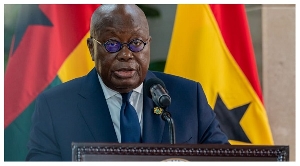- Home - News
- TWI News | TV
- Polls
- Year In Review
- News Archive
- Crime & Punishment
- Politics
- Regional
- Editorial
- Health
- Ghanaians Abroad
- Tabloid
- Africa
- Religion
- Election 2020
- Coronavirus
- News Videos | TV
- Photo Archives
- News Headlines
- Press Release
Opinions of Friday, 9 January 2015
Columnist: dokosi, michael eli
‘Soli’ The Walking Stick Of Journalists
‘Soli’ also known as solidarity has a long history and though its giving and taking is hotly contested, it remains on the cards simply because for some journalists, without it they simply could not even get to venues to cover events for their audiences.
Right from my Diploma days at the African University College of Communications through to my sojourn at the Ghana Institute of Journalism, there have been various points raised about the appropriateness or otherwise of journalists receiving sums from event organisers to cover transport cost.
I dare say the arguments within our ranks are as lively as any to be had by other professionals about us.
A good number of journalists are suffering and lacking funds to even cater for basic necessities. How can a journalist/media personnel be paid 200.00 Cedis in today’s Ghana and even with such paltry sums often the employees are not paid on time when the month ends. Some employers remain in the debt of their employees.
The situation is so bad that a good number of such journalists and media people have little choice but to sleep at the radio/TV stations or newspaper houses. The maltreatment of employees is particularly appalling in the regions.
When I hear people raise the issue of inadequate qualification as being the reason why employers do not remunerate employees well, the simple question I ask is, if such people lack the requisite qualification why are they in the employment of the organization? Why utilise their services be they reporters, presenters or Dj’s but only realise they are deficient when it comes to payment of salary.
The job we do as journalists/media people is a tedious one. Often folks in the industry have inactive social lives because some are compelled to work 7 days a week including holidays and festive periods.
Aside the popular names including Sefa Kayi, Fifi Banson, Abeiku Santana, Adakabre Frimpong Manso, Kojo Yankson, Bernad Avle, Richard Sky, Shamima Muslim, Bola Ray, Kafui Dey, Nana Aba Anamoah, Patrice Amegashie, Kokui Selormey, Barbara Gaisy, Nii Obodie Wentum, Suhuni Alhassan, Fifi Boafo and Ekouba Gyasi who get the thousands many of the producers, reporters who go on the field and do the grounds work get relatively little salaries often in the 500.00 to 800.00 cedis bracket.
Now, in our Ghana, should a journalist depend on this sum to rent a room, pay water and light bills, cater for feeding and transport fare that would be a miracle assuming he has no partner or child.
I find it hypocritical that persons who find everything wrong with journalists taking ‘Soli’ find nothing wrong in taking sums beautifully wrapped in envelopes after appearing on shows as guest or panelist. Some I understand because of the frequency with which they make appearances on radio or TV get paid monthly.
I reckon the giving and taking of ‘Soli’ often is a harmless goodwill gesture. The fate of some interns is a sorry one. Some never get any allowance to cover events they are expected to report on and after coverage do not get reimbursed.
Since they are not rich, the walking stick which aids them to be able to deliver is the ‘Soli’ the event organisers pay the media reps they’ve invited. Do not get it twisted, even the media houses which attempt to provide allowance for staff to use in transporting themselves or those who offer vehicles at the disposal of staff to cover such events I have come to realise occasionally take ‘Soli’ when it’s distributed on time such that the time of filing the news is not lost whiles waiting upon the money man or lady to distribute the soli envelope.
In this regard, the TV folks get the bigger sums because they have to script, do voice overs and then there is the presentation viewers consume. The radio and newspaper guys share the spoils.
The fear of the anti ‘Soli’ campaigners is that when ‘Soli’ changes hands it often has the potency to influence the write up in favour of the organisation or host. Such claims are partially unfounded because the sums quoted here are nothing out of the norm say 20, 50 or 100 cedis.
The tricky issue arises when the journalist and the politician or the businessman strike a friendship such that the fellow calls and checks up on the journalist and at times hang around to have fun such that when the politician or businessman wants a favour, it becomes difficult to decline.
But even with such scenarios, certain journalists lead the way, in that from the onset a journalist ought to define the parameters such that he is accessible but cannot be compelled or coerced.
If as friends, a politician/businessman informs a journalist about a new project he is set to outdoor, he could send the needed information from which the journalist using his skills and bearing in mind the ethics enlightens informs or entertains the public.
Likewise an entertainer can send work for a review but the final say must be the journalist’s. It is when that barrier is breached that alarm bells must tow.
Interestingly there are certain assignments or forums that editors do not delegate, they are in attendance and often come out with nice packages but I trust such editors go about their duties with precision.
It is however easy to see why certain journalists/media folks fall to the whims of public and private figures with such little remuneration. For some time now concerned journalists have called on the leadership of the Ghana Journalist Association to advance the association to a union where the inky folks can have bargaining rights so that employers do not feel they are doing professionals who have toiled to gain certificates and experiences on the field a favour by employing them but as yet the talk shop continues.
The plight of many journalists easily passes for human right abuse. A radio station in Swedru owed workers about 5 months of unpaid salaries eventually the employees were asked to go home when new management took over. A colleague who moved to ply the trade as a sports presenter at a Kumasi radio station has not been paid for four months and incredibly his salary is a paltry 200 Cedis and that’s for a man about 29 years. His plan now is to relocate to Accra. He holds a Diploma in Journalism.
A TV station here in the capital owes staff 3 months of unpaid salaries; the reason cited is that adverts are not coming through so employees who report to work continue to suffer because of someone’s inaction.
Before Choice FM was taken over by Bola Ray and Kwabena Dufuor, the fate of employees there was gloom.
To think that a labourer’s (construction) wage of 30.00 cedis a day is more than most journalists’ salary when aggregated truly sums up the depths to which the ‘4th fourth estate’ folks have fallen.
The challenges which confront many journalists in this country are enormous yet they put up a brave face to honour their obligation often rising as early as 4am and retiring at 11 pm. It is nothing short of a miracle yet at the least opportunity journalists are castigated without circumspection.
The leadership of the Ghana Journalist Association would do humanity some good when they safeguard the interest and very lives of the people they claim to serve.
And oh British High Commissioner, Mr. Jon Benjamin, there is a marked difference between ‘Soli’ and a bribe. For one, bribes are taken in secret while as journalists we write our names, contact address and media houses being represented whereupon after the event, the organiser offers the ‘Soli’ aka ‘TnT’ to board taxi, ‘trotro’ or buy fuel with in the case of those with privately owned vehicles to get to the office on time and compose the story for filing.
‘Soli’ does what walking sticks do, they aid the bearer with mobility, without it a good number of folks with pen would be crippled but we sure don’t want that now, do we?
michael eli dokosi










